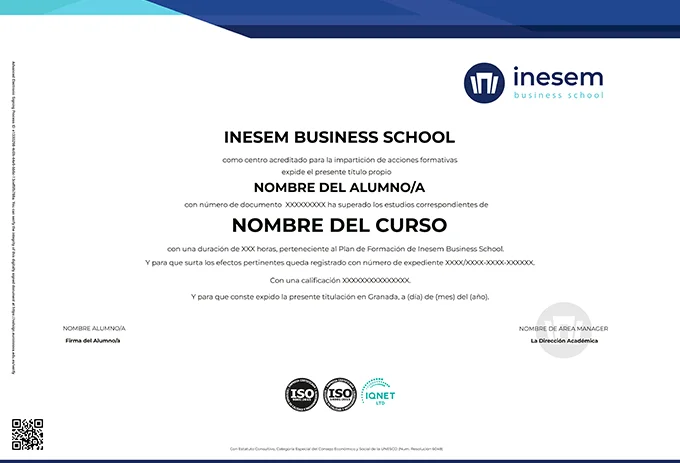- Presentación
- Temario
- Metodología
- Titulación
Descripción
¿A quién va dirigido?
Objetivos
Salidas Profesionales
Temario
UNIT 1. INTRODUCTION TO DATA SCIENCE
- What is data science?
- - The role of data scientists
- - Stages in the data science process
- Necessary tools for data scientists
- Data science - Cloud computing
- - Defining the concept of cloud computing
- - Characteristics of cloud computing
- - cloud models
- - Virtualization
- - cloud storage
- - Reliable cloud providers for data science
UNIT 2. RELATIONAL DATABASES
- Introduction
- - Advantages and disadvantages of databases
- - General concepts
- - The entity-relationship model
- - The extended entity-relationship model
- - Integrity restrictions
- The relational model
- - The structure of the relational model
- - Keys of the relational model
- - Integrity constraints
- - Normalization theory
- - Design of a relational database
- - Types of relational languages
- Structured Query Language (SQL)
- - SQL Features
- - Database management systems with SQL support
- - Syntax SQL
- - Integrity Constraint Specification
- MySQL. A relational database.
- - Characteristics
- - Type of data
- - SQL Syntax for MySQL
UNIT 3. NOSQL DATABASES AND SCALABLE STORAGE
- What is a NoSQL database?
- - Database
- - Relational databases
- - Indexes
- - Primary key
- - Transaction database
- - SQL language
- - Centralized vs distributed systems
- - array
- - JSON format
- - NoSQL Databases
- Relationship databases Vs NoSQL Databases
- NoSQL Database Types: CAP Theorem
- - Distributed databases: Strategies
- - CAP theorem
- NoSQL Database systems
- - Aggregation models
- - Graph models
UNIT 4. INTRODUCTION TO A NOSQL DATABASE SYSTEM, MONGODB
- What is MongoDB?
- How MongoDB works and its uses
- Getting started with MongoDB: Installation and Command Shell
- Creating our first NoSQL database: Model and data insertion
- Updating data in MongoDB: set and update statements
- Working with indexes in MongoDB for data optimization
- - Execution plans
- - Advantages and disadvantages of index creation
- Querying data in MongoDB
UNIT 5. PYTHON AND DATA ANALYSIS
- Introduction to Python
- - Main Features of Python
- - Programming with Python
- What do you need?
- - Installation
- - Installed utilities
- Libraries for data analysis in Python
- - Mathematical and statistical computations with Numpy and Pandas
- - Machine learning algorithms with scitik-learn
- - Data visualization and representation with Matplotlib
- MongoDB, Hadoop, and Python: The Dream Team of Big Data
UNIT 6. R AS A TOOL FOR BIG DATA
- Introduction to R
- - R Commands
- - R Objects
- What is needed?
- - Installation
- - Additional R packages
- - Development environments for R
- Data types
- - Data reading and import
- - Data writing and export
- - Functions
- Descriptive and Predictive Statistics with R
- Integrating R into Hadoop
UNIT 7. DATA PREPROCESSING AND DATA PROCESSING
- Data collection and cleansing (ETL Process)
- - Data cleansing
- - Characteristics of ETL tools
- Statistical inference
- - Statistical inference in R
- Regression models
- - Regression in R
- Hypothesis testing
- - Hypothesis testing in R
UNIT 8. DATA ANALYSIS
- Business Analytical Intelligence
- Graph theory and social network analysis
- - Introduction to Graph Theory
- - Algorithms for community detection in social networks
- - Social network analysis in R
- Presenting results
Metodología
EDUCA LXP se basa en 6 pilares
Titulación

INESEM Business School se ocupa también de la gestión de la Apostilla de la Haya, previa demanda del estudiante. Este sello garantiza la autenticidad de la firma del título en los 113 países suscritos al Convenio de la Haya sin necesidad de otra autenticación. El coste de esta gestión es de 65 euros. Si deseas más información contacta con nosotros en el 958 050 205 y resolveremos todas tus dudas.
Explora nuestras Áreas Formativas
Construye tu carrera profesional
Descubre nuestro amplio Catálogo Formativo, incluye programas de Cursos Superior, Expertos, Master Profesionales y Master Universitarios en las diferentes Áreas Formativas para impulsar tu carrera profesional.
Course in Introduction to Data Science
